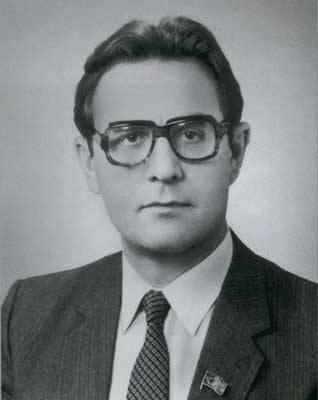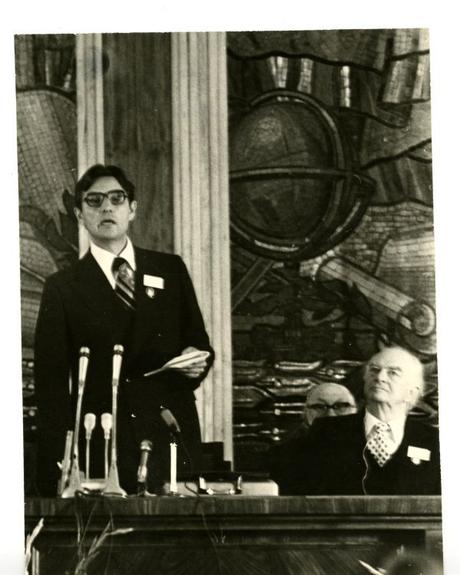 Yuri Ovchinnikov
Yuri OvchinnikovYuri Ovchinnikov, a friend of Linus Pauling’s and the youngest person to ever serve as vice president of the Soviet Academy of Sciences, died thirty-two years ago this month at the age of 53, the victim of an undisclosed illness. A prominent biochemist, much of Ovchinnikov’s work focused on gene-engineering interferons and their potential use in the manufacture of insulin and other medical applications. Ovchinnikov’s contributions were immense and garnered a great many accolades including the Hero of Socialist Labor prize, the Lenin Prize, and the Soviet State Prize, as well as honorary doctorates from universities in Poland, France, Sweden, Bulgaria, Spain, Peru, and East Germany.
Ovchinnikov was born on August 2, 1934 in Moscow. He received his Ph.D. in chemistry from Moscow State University in 1962, and was promptly hired as a research fellow at the Swiss Federal Institute of Technology in Zurich, working under a future Nobel laureate in chemistry, Vladimir Prelog. In 1966 Ovchinnikov returned to Moscow to teach at his alma mater, and in 1970 he attained the rank of full professor at Moscow State University. That same year, he became the director of the Shemyakin Institute of Bioorganic Chemistry, a position that he held until his death in 1988.
Ovchinnikov’s scientific and professional achievements paralleled one another and fueled his rise to prominence in the Soviet Union, the United States and Europe alike. Part of his success could be attributed to his ability to deftly straddle the scientific ideals of a failing Lysenkoist system while incorporating these same principles into the new field of membrane biology. Perhaps more importantly, Ovchinnikov was comfortable crossing disciplinary boundaries from chemistry to biochemistry to biophysics, a trait that he shared with Linus Pauling.
Ovchinnikov is perhaps best known for his work on developing gene-engineered interferons, insulin, and other medically useful preparations, but his scientific contributions were not limited to these areas. Working in Switzerland with Vladimir Prelog, Ovchinnikov was introduced to the stereochemical structures of peptides, a line of inquiry that he continued in the years that followed.
Specifically, Ovchinnikov was interested in unraveling the structure of peptides, a task that had stood as a huge challenge for the scientific community up until that point. As he worked on the problem, Ovchinnikov developed a novel spectroscopic approach that ultimately proved successful in developing an understanding of the structures of various depsipeptides as well as certain antibiotics, such as gramicidin. Ovchinnikov’s achievements were so significant that he is now considered to be a father of what is today called dynamic conformational studies.
Ovchinnikov next turned his attentions to molecules that were even more complex, and in 1979 he published what was perhaps his most influential paper. In it, he outlined a correct model for bacteriorhodopsin, the first time that this had been done for a membrane protein. In fact, many of the structures that he found in bacteriorhodopsin, which were completely novel at the time (such as its seven transmembrane sections) are found in other molecular structures, including membrane pumps, channels, and receptors.
The biomedical implications of Ovchinnikov’s work quickly became apparent, and it did not take long before he was collaborating with scientists all over the world. As the collaborations matured, Ovchinnikov began to apply computer modelling techniques to correctly predict the structures of other highly complicated structures, including pig kidney enzymes. This particular discovery eventually led Ovchinnikov to use recombinant DNA to investigate human enzyme functions and structures, which in turn led to the gene-engineering work for which he is so highly regarded today.
 Ovchinnikov speaking at the Lomonosov Gold Medal ceremony, Moscow, 1978
Ovchinnikov speaking at the Lomonosov Gold Medal ceremony, Moscow, 1978In 1974 Ovchinnikov became vice-president of the Soviet Academy of Sciences, and it was in this capacity that his life began to overlap with Pauling’s. One of Ovchinnikov’s tasks for 1977 was to edit a book to honor the 70th birthday of M.M. Shemyakin, a famous Soviet scientist, and Pauling was asked to submit a contribution. Pauling agreed to do so and drafted a paper titled “The Nature of the Bonds Formed by Transition Metals in Bioogranic Compounds and other Compounds.” Not long after, Pauling was awarded the Lomonosov Medal during a trip to the USSR, and it was during this visit that he met Ovchinnikov for the first time.
The two became much more closely acquainted in the summer of 1984 when Pauling spent an additional three weeks in the Soviet Union, in part to attend a conference on “Frontiers in Bioorganic Chemistry and Molecular Biology.” Ovchinnikov was Pauling’s host for that trip, and the two men spent nearly the entire time together. Their friendship cemented by this experience, Pauling returned home from his travels with a profound respect for Ovchinnikov and his scientific work.
Indeed, evidence of a strong, cordial relationship shows up in the correspondence that followed. In January 1985, Ovchinnikov wrote to Pauling to tell him that he was writing a book about bioorganic chemistry and wished to include short biographies of some of the great men in the field. Naturally, he hoped to include Pauling, and asked if a suitable photograph might be supplied. (Pauling was happy to comply.) Two years later, when Ovchinnikov and his brother published a paper on organic polymer ferromagnetism in the highly respected journal Nature, Pauling took the time to send a note of congratulations and best wishes.
When Ovchinnikov unexpectedly passed away in 1988, large segments of the scientific community came together to mourn the loss. In Pravda, a Russian language newspaper based in Moscow, sixty-five prominent Soviet figures signed a letter expressing grief at Ovchinnikov’s passing. Notably, the first signature to appear was that of Soviet premier Mikhail Gorbachev.
Pauling seemed equally shaken by the news. In a letter to Ovchinnikov’s replacement at the Shemyakin Institute, Pauling wrote, “It was one of my pleasures to have been acquainted with Yuri Ovchinnikov for a number of years and to have the benefit of conversations with him about scientific problems. His death is a great loss.” In a separate correspondence, Pauling reflected of his old friend that
If he had lived, he would, I am sure, have become an even more valuable person in developing science in the Soviet Union and improving the relationship between the Soviet Union and the United States. He had a fine personality and a very good mind.
